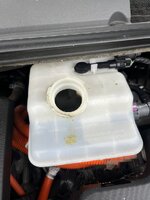No issues with my brakes, but had a conversation with a coworker about flushing brake fluid and I I went out to check mine because why not and the brake fluid on my Volt looks gross. It’s not super urgent as mostly braking is done by regen but I would like to have clean fluid to ensure long lifespan of the rest of the brake system. I suspect the brake fluid is original to the car.
I’m wondering if there’s anything special I have to do on this car or just the good ole jack it up open bleeder screw and have a friend pump the brakes? Will I need to bleed ABS module with a scanner or something? Thanks.
I’m wondering if there’s anything special I have to do on this car or just the good ole jack it up open bleeder screw and have a friend pump the brakes? Will I need to bleed ABS module with a scanner or something? Thanks.

